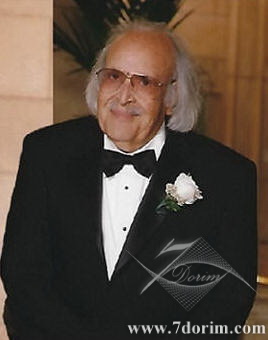
Eliyas Màshàl — Poet and storyteller
Eliyas Màshàl was born in 1926 into a devout Jewish family in the small town of Rafsanjan, Iran. His father, “Haim Màshàl”, was a respected merchant in the local market.
Eliyas completed his primary education at Hedayat School and immediately joined his father in the market. Growing up in a family where reading and studying books held significant importance, Eliyas demonstrated a deep passion for reading and learning from a young age. Among seven sisters and six brothers, he stood out with a vibrant devotion to literature, often dedicating his time to studying the works of renowned Iranian poets and Persian literature.
In 1949, Eliyas Màshàl met a woman named Sebi Dokht from the Sebi family in Kerman. They developed a deep affection for each other, leading to a solid marital bond and a union throughout their lives. This happy family also had a daughter named Farshid and two sons named Saeed and Siamak. All three of Eliyas Màshàl’s children pursued higher education.
Eliyas joined the Tudeh Party in Iran during his younger days, an Iranian communist party. His social and political activities started with distributing underground pamphlets, and he gradually became a more prominent member, actively engaging in Marxist political activities.
The Tudeh Party was eventually exposed in Rafsanjan, and its members faced persecution. Eliyas Màshàl was forced to flee to Tehran along with his two brothers, who had also joined the party, to avoid government agents. In Tehran, they found temporary refuge with Tudeh Party friends.
After an amnesty was granted by the government, Eliyas decided to step away from politics and embrace a normal life. He was reunited with his wife and daughter, Farshid, in Tehran, where Eliyas embarked on a new career journey as an assistant attorney at a law firm.
Eager to secure a more stable future, Eliyas took on accounting, pursuing academic studies in the field. He became a highly skilled accountant and this became his life-long job.
Eliyas Màshàl initially began his cultural endeavors with short stories and poetry. He was a member of the Calligraphers Association, often penning his poems in a beautiful Nastaliq script. Possessing a delicate poetic nature, his compositions often exhibited rhythm and rhymes. Later, he also embraced the art of composing modern-style Persian poems (i.e. Shi’ri Now شعر نو) with structured rhyme schemes.
He was a member of literary societies and established connections with cultural and literary figures in order to deepen his literary abilities, including renowned Jewish Persian poet “Abdollah Talee hamedani”, from whom he learned quite a lot. With determination and effort, he soon became a notable storyteller and poet. His creative talents, especially in storytelling, were outstanding from the beginning. He later concentrated his literary studies on both prominent global authors and contemporary Iranian writers, such as Simin Daneshvar, Sadegh Hedayat, and Forugh Farrokhzad.
After the Islamic Revolution, Eliyas became more interested in mystic poetry, philosophical texts, metaphysics, world philosophers, and the history of monotheistic religions. He turned to Indian philosophy, yoga, and meditation to achieve worldly comfort and spiritual tranquility for his family. He even attended hypnotherapy classes to master control over his thoughts. He was instructed by Dr. Kalook and progressed to the verge of mastery in this field.
Despite facing difficulties in life, Eliyas remained committed to learning and mastering various art forms, including woodworking, photography, and calligraphy. Despite the challenges he faced in his life, he never hesitated to seize the opportunity to learn and make use of the knowledge he acquired.
In 1989, Mr. Màshàl involuntarily immigrated to Los Angeles, leaving his homeland behind and settling with his family. After settling in Los Angeles and establishing stability, he initially worked part-time accounting for friends and acquaintances. But as retirement years passed, he devoted more of his time to writing and poetry. He also set to complete his writings that had been left unfinished in the past.
Eliyas Màshàl was diagnosed with terminal cancer in 1994. After a ten-year battle, he passed away in 2004 at the age of 79. His legacy includes an invaluable collection of writings, poems, and calligraphy. Despite years of writing, he never showed an inclination to publish his works, as if a mystery of some sort prevented him from doing so — a mystery that remained unsolved even after his death.
Following his passing, his children gathered and edited his unpublished works. In 2019, a portion of his poems was published in a book titled “Ayineh Shekasteh” (i.e. Broken Mirror), along with a collection of short stories titled “Jayeh Payeh Eshgh” (i.e. Footsteps of Love), which had been written in 1971. Three other collections were also printed and published, including the short-story book “Talabkar” (i.e. Creditor; written in 1988 in Tehran), “Eshghhayeh Bazari” (i.e. Marketplace Loves; written in Los Angeles in 1991), and “Dar Basatere Zaman” (i.e. In the realm of time; written in 1999 in Los Angeles). These books were inaugurated in a ceremony at UCLA with the presence of intellectuals, cultural professors, and enthusiasts of Iranian poetry and literature. His family intends to prepare his remaining writings and calligraphy for publication.
A poem from Eliyas Màshàl:
حیف از این دانش و بینش که ره خاک گرفت
Alas for this knowledge and insight that has taken to the path of dust,
شرم از این شیوه نگین که چه بی باک گرفت
Shame that this beautiful method is taken [by death] without concern,
سوز دل، اشک مرا خونین کرد
The burning of my heart has turned my tears into blood,
جور این دهر دلم چرکین کرد
[And] the cruelty of this world has broken my heart.

The Màshàl family — from the right side: Fereshteh, Eliyas, Siamak, Mojgan, Sebidokht, and Saeed. Los Angeles, 2


 فارسی
فارسی